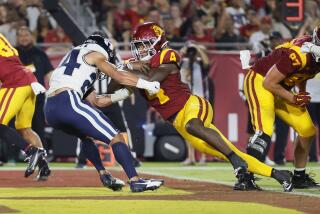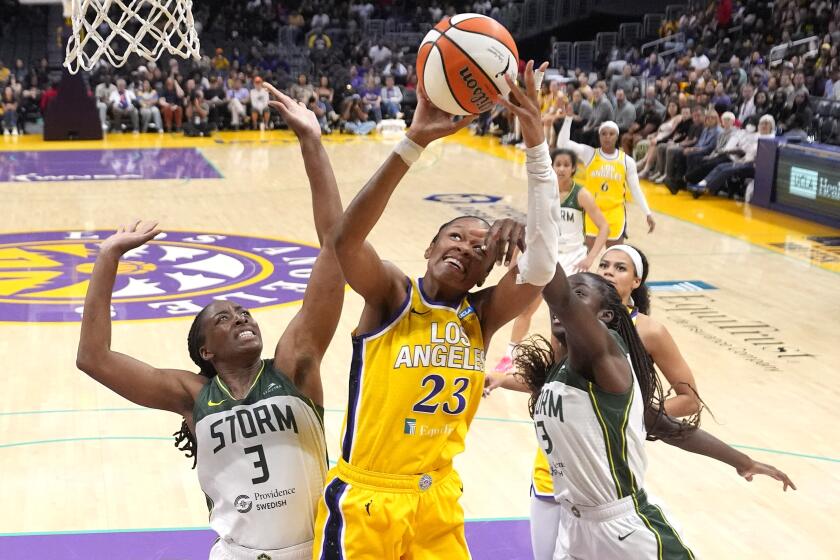Something doesn’t smell right around the BCS
The Bowl Championship Series can probably survive controversy and silliness and talk-radio arguments and, more than likely, political bullying from windbag representatives interested mainly in their reelections.
What the BCS can’t survive is the overhanging cloud of scandal or conspiracy.
We’re starting to hear whispers: I can verify the source of one of these rumors because I started it.
Pssssst: The top schools appear to be getting BCS protection from officials because it’s in the best interest of the conferences for the best teams to win.
A second team in the BCS means an additional $4.5 million to conference coffers.
A conference advancing a team to the national-title game brings huge exposure and revenue to the school and the league.
Superstars always get preferential treatment, if you believe your eyes and the shady accounts of an ex-NBA referee, who traded his old stripes for prison stripes.
Didn’t Magic Johnson get every call at the end of the important playoff game?
Yeah, but that’s different. In a seven-game series, things tend to even out . . . or at least sometimes.
In college football, one bad call can cost you everything.
Do officials want the best teams to win?
No way -- that’s impossible to believe.
But there have been enough strange calls lately to warrant a serious crackdown on getting it right for the sake of not having columns like this written.
Two weeks ago, Florida got the benefit of several calls in a close win against Arkansas, so many in fact that the SEC suspended the crew.
A week ago, Tennessee lost to Alabama by two after a last-second field-goal try was blocked. Volunteers Coach Lane Kiffin said he didn’t run another play to get his kicker closer because he feared getting called for another penalty. Tennessee had eight flags in the game to Alabama’s one.
Saturday, Indiana caught the short end of several calls that benefited Iowa, an undefeated team with national-title aspirations.
Indianapolis Star columnist Bob Kravitz wrote the game felt “like a Brinks robbery” and made note of “an inept group of officials who took 14 IU points off the board with bogus calls on obvious touchdown passes.”
The most egregious error occurred when the replay booth overruled an Indiana touchdown that would have given the Hoosiers a 28-14 lead.
A scoring pass to Terrance Turner was ruled complete on the field. The referee was in perfect position to make the call and did not hesitate in his decision.
Yet, upon further review, it was overruled in the booth.
Wait a minute -- what happened to irrefutable proof?
A few weeks earlier, Washington shocked Arizona on a pass that deflected off an Arizona receiver’s foot, with the Washington player returning the “interception” for the game-winning score.
It seemed impossible the ball didn’t hit the ground.
Given Arizona’s only other loss this year was to Iowa, and that Arizona is the only Pac-10 or Big Ten team never to play in a Jan. 1 Rose Bowl, that call may turn out to mean something.
I called Verle Sorgen, director of instant replay for the league, and he gave me an emphatic explanation.
He said there must be irrefutable proof that the original call was wrong.
What does that mean?
Sogren said if you gathered 100 college football experts in a room to look at the play, 99 of them would have to come to a consensus.
Wow, that’s some burden of irrefutable proof, but if that’s the rule . . .
OK, then, how do you explain the Big Ten overturning Saturday’s call in Iowa City?
No one with two eyes could say it was irrefutable that Turner was not inbounds when he caught the pass.
Instead of a touchdown, Indiana settled for a field-goal attempt that went awry and Iowa soon tied the score and won in a runaway.
It is not enough, in hindsight, for the conferences to keep issuing apologies.
There has to be a better answer than conference commissioners reprimanding coaches for criticizing officiating crews that end up getting suspended because the coaches were right about the refs being wrong.
The SEC admitted that its officials blew it in Florida-Arkansas and the Big Ten should admit that the Indiana touchdown should have been upheld.
How about some consistency?
Because the Pac-10 and Big Ten champions play each other in the Rose Bowl, it makes sense that irrefutable proof in one league should be irrefutable in the other.
Instead of apologizing all the time, how about getting the call right? Or else, junk instant replay.
If we, the non-experts, can see it, why can’t the experts?
The future of the BCS ultimately hinges on its transparency and the integrity of its games.
It was outrageous, but hilariously OK to me, when USC in 2003 finished No. 1 in both polls but couldn’t play in the BCS title game because it finished No. 3 in the standings.
Hey, they came up with these stupid rules and that’s just the way it shook out.
Besides, an acceptable outcome prevailed when the AP voted USC a share of the national title.
It was less OK in 2004, however, when Texas edged California for a Rose Bowl spot because deciding votes suspiciously tipped toward Texas even after Cal beat Southern Mississippi on the road.
The aftermath of this was so ugly that the AP pulled out of the BCS formula and several news organizations, mine included, issued a ban forbidding their writers from participation in polls.
In the news business, credibility is imperative.
It must also be for the BCS.
If you’re going to continue with this unbelievable creation to ferret out championships, it has to be believable.
--
More to Read
Go beyond the scoreboard
Get the latest on L.A.'s teams in the daily Sports Report newsletter.
You may occasionally receive promotional content from the Los Angeles Times.











